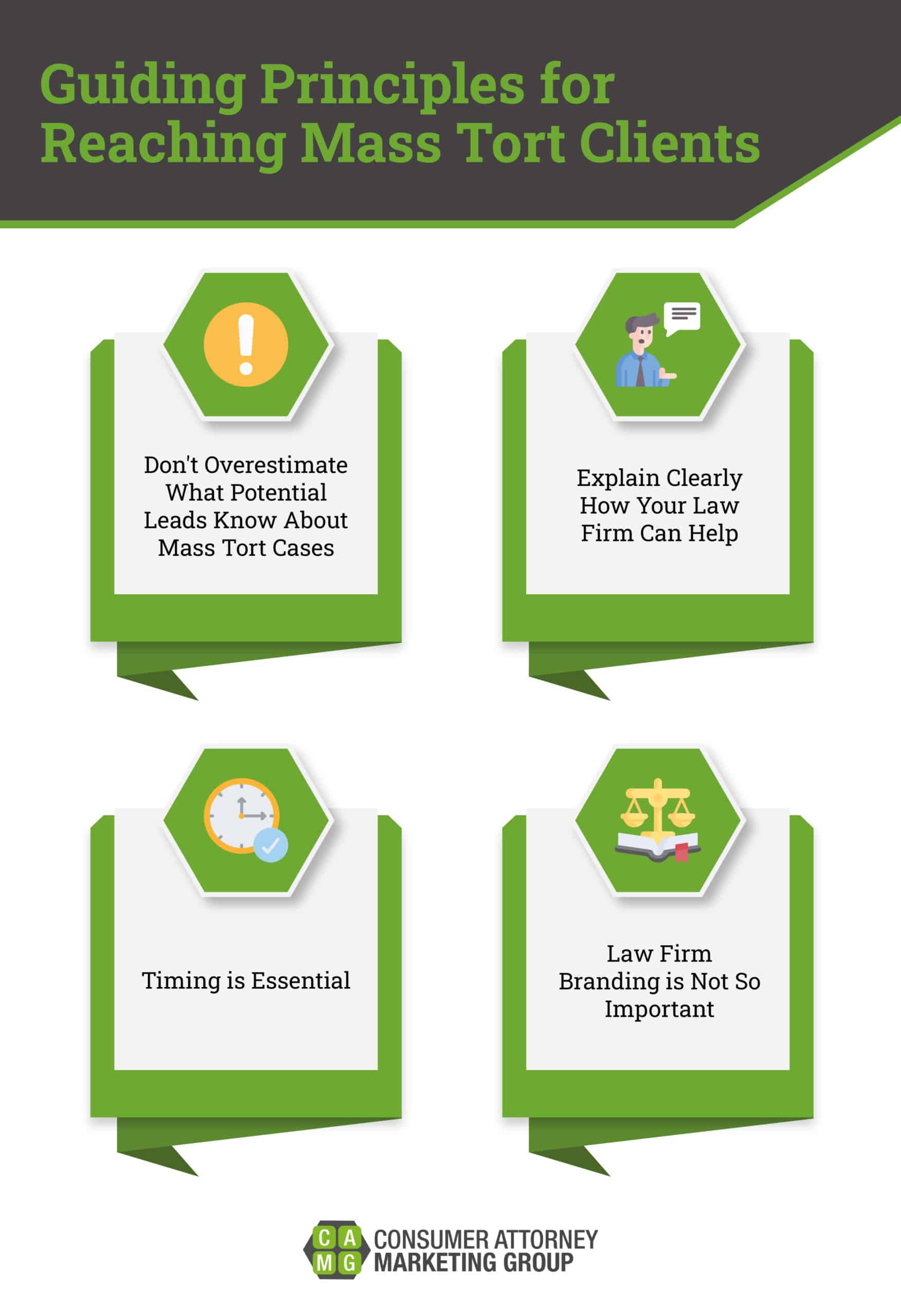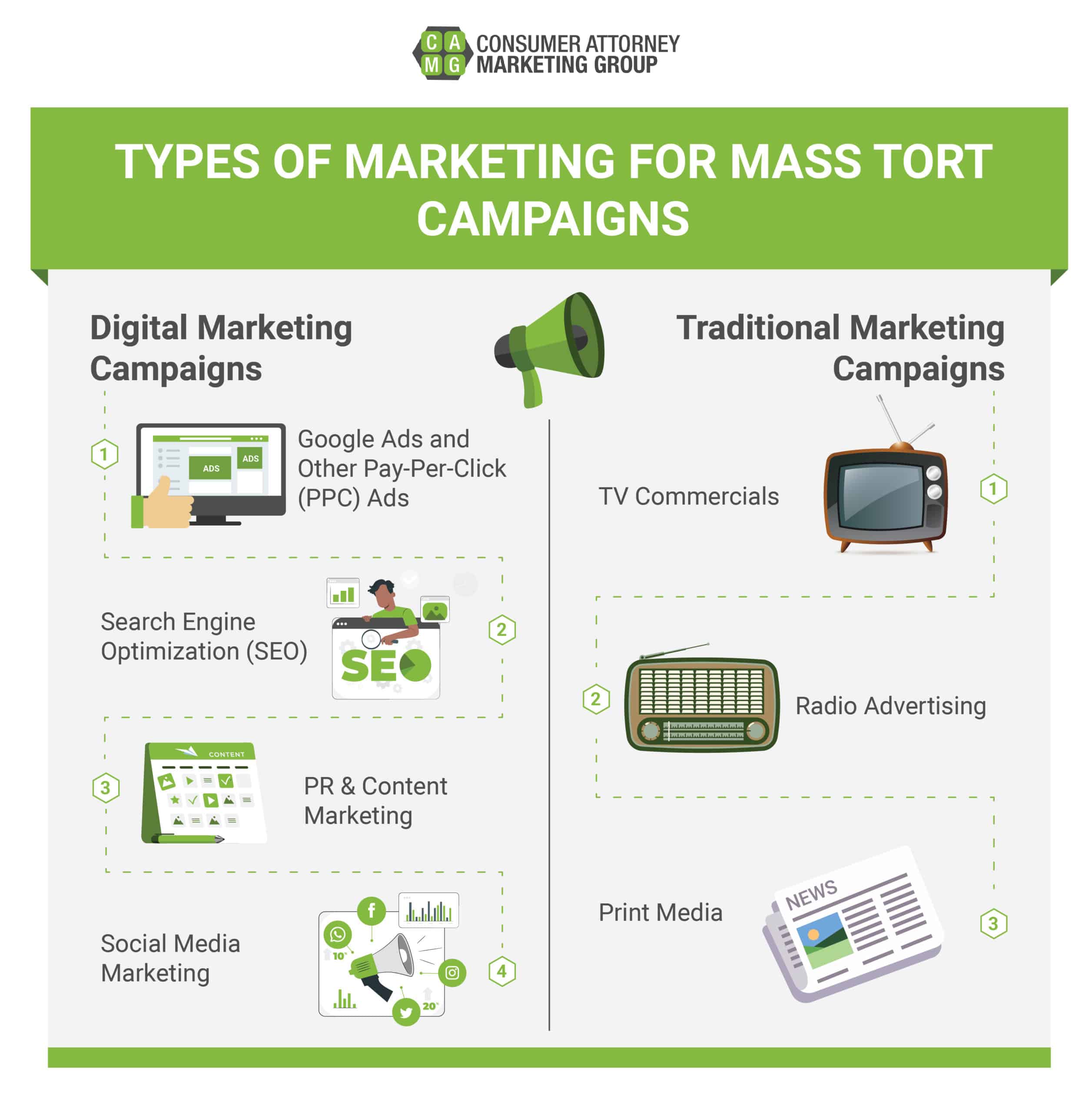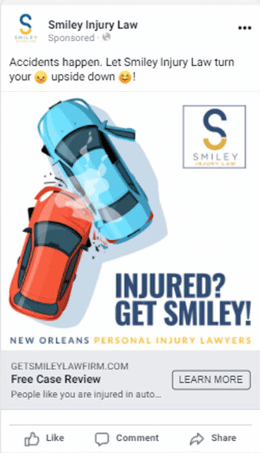If your law firm has an established mass tort practice or is considering taking on mass tort cases, the opportunities available to reach potential clients have never been more plentiful—or more complicated. With the dizzying array of marketing channels and strategies to choose from, the path to cost-effective and ethical growth can be daunting to navigate.
This guide outlines the key marketing channels and strategies for mass tort lawyers. By following a few guiding principles, you can develop a marketing plan to successfully reach new clients and grow your practice without breaking your budget or crossing ethical boundaries.
What is mass tort marketing?
Mass tort marketing is the process of identifying and communicating with potential plaintiffs in mass tort litigation. This type of marketing involves finding individuals who may have been injured by a defective medical product or harmful substance and persuading them to pursue a legal claim.
Like other types of marketing for personal injury firms, marketing for new mass tort clients requires a clear understanding of the target audience, persuasive messaging, and the effective use of media channels.
What's the difference between marketing for mass torts and general marketing for personal injury law firms?
Compared to mass tort marketing, personal injury firms tend to use more vague language in their advertising to identify leads among people with various types of unique injuries, circumstances, and backgrounds. Mass tort marketing, on the other hand, can be more precise in its messaging because it targets potential mass tort claimants injured by a particular product or substance.
Unlike personal injury cases, which can be highly individualized, mass tort cases may involve many plaintiffs with similar injuries and experiences. For example, because the same defective medical devices may have injured thousands of potential victims, successful mass tort marketing campaigns will directly mention specific product names and associated injuries in their messaging, which leads to your firm receiving leads from claimants that meet specific criteria.
Guiding Principles for Reaching Mass Tort Clients
Before we explore the benefits, drawbacks, and tips for executing available marketing strategies, here are a few fundamental principles to help guide your mass tort marketing campaign.

Don't Overestimate What Potential Leads Know About Mass Tort Cases
In any mass tort, the vast majority of potential clients will have no idea that they may have a legitimate claim. According to research from the RAND Corporation, only 10 to 20 percent of the potential plaintiffs harmed by a mass tort will ever file a claim.
This lack of awareness presents a unique challenge for mass tort law firms. A successful marketing campaign must not only reach mass tort leads but also educate them about the existence of the litigation itself. Your messaging should also clearly list the specific products involved in the litigation and how they might connect to the potential client’s injuries.
Explain Clearly How Your Law Firm Can Help
Educating potential clients about a mass tort is only the first step. To persuade someone to pursue a claim through your law firm, your marketing messaging should give precise details about how your law firm can assist them.
Remember, many of the individuals you are targeting will have no prior experience with the legal system. For example, they might be unaware of how contingency fees work. Therefore it’s critical to emphasize that they will not have to pay any upfront costs for your legal services. Also, ensure that your messaging highlights your law firm’s experience handling similar mass tort cases and features testimonials from past clients. Did you help clients with Actos, Roundup, Transvaginal Mesh, or Hip Replacements? Showcase your past successes.
Timing is Essential
When it comes to mass tort marketing, the right timing will be critical to your success. Once you’ve done your homework to identify a promising mass tort opportunity and developed a well-defined target audience, you need to act quickly to educate potential leads.
Because competing law firms will also be targeting the same individuals, it’s vital to get your message in front of potential clients before they hear from someone else. You’ll also need to ensure that you’ve set up a reliable intake service to quickly capture leads and contact information from interested individuals.
Law Firm Branding is Not So Important
For personal injury law firms, developing a compelling brand identity can be crucial to success. But in mass tort marketing, your law firm’s brand will likely take a backseat to the name of the harmful product or injuries involved in the litigation.
By focusing instead on your educational messaging and ensuring that potential clients understand how your law firm can help them, you can position your firm to succeed with your mass tort marketing campaigns.
Lead Generation Ethics and Compliance
As you develop your mass tort marketing strategy, keeping ethical considerations and compliance requirements in mind is critical to protecting your law firm and clients. In particular, mass tort firms working with lead generation services must be highly cautious about trusting mass tort marketing services that might be cutting corners to acquire leads.
A lead generation provider may promise high-quality leads, but your responsibility is to ensure that the company and its practices comply with all applicable rules and regulations. It’s up to you to perform proper due diligence to verify that the company does not use misleading tactics to generate mass tort leads, such as promising potential clients that they will receive a financial reward for participating in a mass tort case.
Many states have strict rules about how the legal marketing industry can purchase and use leads. Some mass tort firms have faced scrutiny and even sanctions from state bar associations for using lead generation services.
Before hiring a lead generation service, we recommend that you:
- Carefully review and understand your state’s Rules of Professional Conduct and the rules of the state where you are seeking to acquire clients.
- Consult with a qualified ethics attorney before working with any lead generation service.
If you do choose to work with a lead generation service, we recommend that you:
- Sign a contract that requires the company to comply with all applicable rules and regulations.
- Regularly review the leads provided by the company to ensure they are of high quality.
- Educate your intake team about your state’s requirements for working with these leads.
- Monitor your firm’s website and advertising materials to comply with applicable rules and regulations.
Choosing the Right Media Channels for Mass Tort Campaigns
So how do you determine which media efforts will be most effective for reaching your target audience with your mass tort marketing campaigns? The answer will vary depending on the demographics of your target audience and the specifics of the mass tort.
For example, if your target audience is older adults, a more traditional marketing approach that relies on print or television ads may be the most effective. If you’re targeting younger individuals, a digital marketing strategy that includes paid search ads and social media marketing may be a better choice. Because there is no one-size-fits-all answer, you can experiment with multiple media channels to determine which generates the most high-quality leads for your marketing dollars. CAMG runs media campaigns for all mass torts and can help your law firm choose the right marketing mix for your campaigns.

Digital Marketing Campaigns
Digital marketing campaigns can be an extremely effective way to reach people who are eligible to join mass tort claims. By targeting individuals who have shown an interest in the product or injury at issue, you can ensure that your law firm’s message will be seen by an audience that’s likely to be interested in what you have to say.
Law firms can use several digital marketing channels to reach potential clients, including:
Google Ads and Other Pay-Per-Click (PPC) Ads
Google Ads, streaming ads, Instagram ads, and other paid search ads put your message in front of individuals actively searching for information about the product or injury involved in the mass tort litigation.
Because you only pay when someone clicks on your ad, PPC ads can be an extremely cost-effective way to generate leads for your law firm. By targeting your ads to specific keywords and locations, you can match your message to individuals who are most likely to be a receptive audience.
Search Engine Optimization (SEO)
SEO is a technique for developing your law firm’s website and online content to rank higher in search engine results. For example, SEO experts can help you choose the right keywords to target on your website’s content so that your site appears higher in search results, making it more likely that potential clients will find and visit your site.
Additionally, law firms can use SEO to generate inbound links to your website from other high-quality websites. These links signal to search engines that your website is a trusted resource, which can help improve your website’s search engine rankings.
PR & Content Marketing
Content marketing such as blog posts, infographics, ebooks, and other digital media that educate potential clients can help you attract individuals interested in learning more about a specific mass tort case. Because PR focuses on providing valuable information rather than selling a product or service, it can help build trust with potential clients. It can also position your law firm as a thought leader in your industry, which can help your firm receive referrals from other law firms that aren’t handling a specific litigation.
Social Media Marketing
Social media platforms like Facebook, Twitter, and LinkedIn offer a unique opportunity to connect with new leads. You can build relationships with a broad audience by sharing engaging content and case updates. Many mass tort firms also succeed by participating in online forums and message boards, such as Reddit or Quora, which can build trust and credibility with users who may eventually become clients.
Paid social media advertising, including Facebook and Instagram ads, can also be used to target individuals based on interests, demographics, and behaviors.

Traditional Marketing Campaigns
Traditional marketing campaigns rely on many of the mass media advertising channels that successful businesses have been using for decades, such as:
TV Commercials
Although the prominence of TV ads has diminished as younger audiences move online, according to the U.S. Chamber Institute for Legal Reform, lawyers spend about $900 million per year on television advertising alone.
For firms specializing in mass torts, running TV ads and infomercials during news programs or other shows popular with an older target audience can generate a high volume of new clients. CAMG offers short-form, long-form, and legal informercials to generate interest and leads for your firm.
Camp Lejeune Long-Form Infomercial
Camp Lejeune Short-Form Commercial
Radio Advertising
Engaging radio ads are another traditional marketing tool that can effectively reach potential clients interested in mass tort litigation. Radio ads are typically less expensive to produce than TV commercials and can influence a large commuter audience. Like television, radio advertising may be most effective with older audiences. However, because many people listen to the radio online (via podcasts or streaming services), radio ads can also be an effective way to reach a younger audience.
Print Media
Despite the prominence of digital media, print advertising in newspapers, magazines, and billboards can still be an effective marketing tool, especially in local markets. Law firms often find success by targeting print ads to specific demographics, such as older adults or individuals who live in areas affected by a dangerous product or device.

Choosing a Legal Marketing Company for Mass Tort Ad Campaigns
While some law firms may handle their marketing efforts in-house, others may prefer to partner with a legal marketing company specializing in mass tort advertising. Choosing the right marketing company can ultimately determine whether a marketing campaign succeeds or flops.
A reputable legal marketing company will deeply understand the unique challenges in marketing mass torts. They will also be experts in the latest digital marketing techniques and be able to develop a tailored multi-channel marketing strategy that meets your specific needs. In addition to requesting case studies or other examples of their work, you should also ask:
- How does the company generate leads for mass tort claims?
- What’s their strategy for SEO, PPC, and content marketing?
- Does the company have a deep understanding of mass tort law?
- How do they measure the success of their campaigns?
- What is their pricing structure?
About Consumer Attorney Marketing Group (CAMG)
Consumer Attorney Marketing Group (CAMG) has the answers to all these questions and more. As a full-service advertising agency, CAMG has decades of experience helping mass tort practices recruit new clients through multiple marketing channels.
We specialize in digital marketing, SEO, PPC, social media, traditional marketing, PR, and television and radio ads. Contact us to request a free consultation with one of our mass tort marketing experts. We can help you develop a customized multi-channel marketing strategy to grow your practice.

